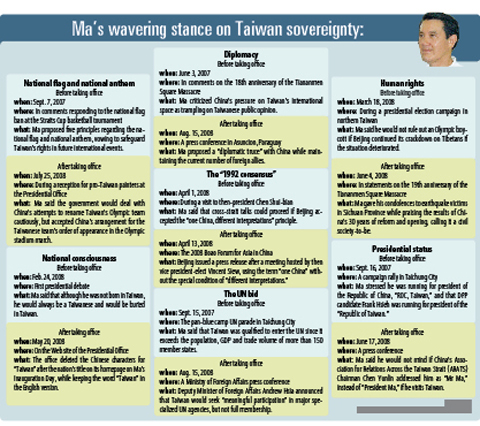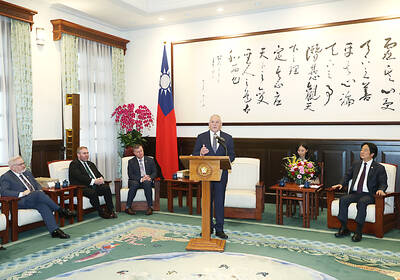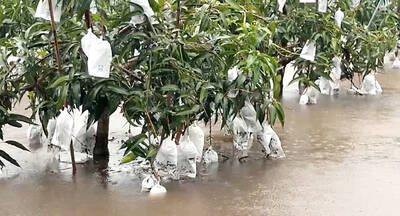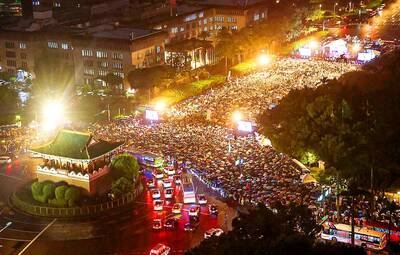President Ma Ying-jeou (馬英九) gave people unrealistic expectations with his presidential campaign slogan “Ma will turn things around right away” (馬上好), and has failed to improve the country’s economy despite his efforts to fulfill campaign promises following his inauguration on May 20, analysts said.
“His campaign slogans were too dramatic, and now he blames the global economy when failing to improve the situation. Didn’t he know the global economy was heading for recession when he made his promises?” said Shih Cheng-feng (施正鋒), dean of National Dong Hwa University’s College of Indigenous Studies, referring to Ma’s prominent campaign slogans — “Ma will turn things around right away” and “We are ready!”
The two slogans were believed to be a factor behind Ma’s decisive victory in the March presidential election, as they satisfied the public’s desire for a better economy.

Ma had accused the former Democratic Progressive Party (DPP) government of retarding economic growth because of its conservative cross-strait policy, and promised to boost the nation’s economy through his “i-Taiwan 12 construction projects” and “6-3-3” economic platforms.
The Council for Economic Planning and Development and the Council of Labor Affairs acknowledged that it would be difficult to reach Ma’s “6-3-3” goals — an annual economic growth rate of 6 percent, annual per capita income of US$30,000 by 2016, and an unemployment rate of less than 3 percent per year.
The Directorate-General of Budget, Accounting and Statistics earlier this month lowered its GDP growth forecast for this year from 4.78 percent to 4.3 percent.
Tu Jenn-hwa (杜震華), an associate professor at National Taiwan University’s Graduate Institute of National Development, expressed pessimism about the Ma administration’s ability to fulfill the “633” economic promise within the next four years.
“The possibility of achieving the ‘6-3-3’ promise is slim because of the global economic slowdown and inflation. The picture he drew was too ambitious, and it’s almost impossible to realize such a bold promise in his four-year term,” he said.
Ma’s administration has blamed its failure to fulfill economic promises on the global slowdown, while pinning its hopes on opening the economy to China to achieve its GDP goal.
But Tu said Ma would fail to lower the unemployment rate to less than 3 percent unless he can create 100,000 new jobs, and such a goal would be extremely difficult to achieve even if the government relaxed the investment cap on China and managed to bring more Chinese tourists to Taiwan.
Commodity and utility price increases and a poor stock market performance also added to people’s economic anxieties, causing Ma’s popularity to decline sharply.
The Ma administration prided itself on carrying out Ma’s campaign promise last month by implementing cross-strait weekend charter flights and welcoming a 600-member inaugural Chinese tour group on July 4.
The cross-strait weekend charter flights were to bring in up to 3,000 Chinese tourists per day in the initial stage, with the number increasing to 10,000 per day within four years, creating NT$50 billion (US$1.6 billion) in annual revenue for the tourism industry, Ma had pledged.
Statistics from the Tourism Bureau, however, show that the actual number of Chinese visitors amounts to less than 300 per day on average, with only 27 of the 198 qualified hotels around the country receiving Chinese tourists.
“He fulfilled only part of his cross-strait campaign platform, and we haven’t seen any signs that he is ready to carry out the rest. Besides, opening up the country to Chinese tourists without a strategy won’t help the economy,” said Tung Li-wen (董立文), a cross-strait expert and professor at the Central Police University.
Although cross-strait charter flights were implemented, cargo charter flights, which are urgently needed by Taiwan and its industries, were left out by Ma’s administration, he said.
The Ma administration relaxed several restrictions on China-related trade issues, such as lifting the 40 percent cap on China-bound investment, allowing overseas companies with Chinese capital to list on the local stock market and allowing Chinese qualified domestic institutional investors (QDIIs) to invest in the stock and futures markets on a case-by-case basis.
Days after assuming office, the Cabinet sparked widespread complaints from the public by abruptly and sharply raising fuel prices. Commodity prices, on the other hand, increased 3.74 percent from 1.8 percent last year.
The TAIEX’s performance, which plunged to below 7,000 points last month, also fell short of Ma’s promise that his administration would boost the stock market beyond 10,000 points.
Surveys have shown Ma’s popularity dropped significantly over the past two months as a result of his failure to lead the country out of economic hardship.
A DPP survey conducted on the eve of Ma’s 100th day in office found his approval rating had plummeted to 36.9 percent from nearly 55 percent in May, with his disapproval rating increasing from 32 percent in May to 57 percent.
Another poll from China Credit Information Services Ltd on Aug. 20 found that only 15 percent of corporate managers from the nation’s top 500 corporations were satisfied with Ma’s performance.
Ma has acknowledged public frustration with the current economic hardship, and urged people to be patient.
“I feel the people’s pain, and my administration will take people’s anger seriously, rather than dodging it,” he said on July 12.
Premier Liu Chao-shiuan (劉兆玄), on the other hand, admitted that the government needed more time.
“The campaign slogan put a lot of pressure on us. I think the slogan should have been ‘Ma will turn things around gradually’ (馬上漸漸好),” he said on June 28.
As the Chinese Nationalist Party (KMT) government struggles to fulfill the heart of Ma’s campaign platform on cross-strait and economic promises, other campaign platforms such as education, culture, labor and environmental protection appear unlikely to be fulfilled in the first year.
Minister of the Council of Labor Affairs Jennifer Wang (王如玄) and Minister of the Interior Liao Liou-yi (廖了以), for example, acknowledged on different occasions that Ma’s promises of two-year maternity leave with 60 percent salary for the first six months and a NT$2 million zero-interest loan for first-time home buyers would not be implemented this year.
The Ma administration’s ability to fulfill its environmental promises was further challenged by environmental activists, as they accused Ma of failing to find a balance between economic development and environmental sustainability.
They also accused Liu of breaking Ma’s campaign promise of exploring alternatives before deciding whether to construct the Suhua Freeway (蘇花高) by announcing last month it would start the construction of part of the proposed freeway.
Environmentalist Li Keng-cheng (李根政), director of the Mercy on the Earth Association, lambasted Ma’s administration, describing Ma’s environmental policy as “contradictory,” and urged the president to re-examine his policies before carrying them out.
“He promised to reduce carbon dioxide emissions, but gave permission for the construction of several coal-fired power plants. He promised land conservation, but supported the reconstruction of the central cross-island highway. It’s ridiculous,” he said.
Li approved of the Ma administration’s efforts to promote energy conservation and carbon reduction by requiring government officials to dress down and drive smaller cars.
Most importantly, however, the president must demand heavily polluting companies meet energy-saving regulations, he said.
“You can’t ask people to reduce their personal carbon footprint, and yet indulge big enterprisesby allowing them to emit huge amounts of waste gas,” Li said.

‘NON-RED’: Taiwan and Ireland should work together to foster a values-driven, democratic economic system, leveraging their complementary industries, Lai said President William Lai (賴清德) yesterday expressed hopes for closer ties between Taiwan and Ireland, and that both countries could collaborate to create a values-driven, democracy-centered economic system. He made the remarks while meeting with an Irish cross-party parliamentary delegation visiting Taiwan. The delegation, led by John McGuinness, deputy speaker of the Irish house of representatives, known as the Dail, includes Irish lawmakers Malcolm Byrne, Barry Ward, Ken O’Flynn and Teresa Costello. McGuinness, who chairs the Ireland-Taiwan Parliamentary Friendship Association, is a friend of Taiwan, and under his leadership, the association’s influence has grown over the past few years, Lai said. Ireland is

A saleswoman, surnamed Chen (陳), earlier this month was handed an 18-month prison term for embezzling more than 2,000 pairs of shoes while working at a department store in Tainan. The Tainan District Court convicted Chen of embezzlement in a ruling on July 7, sentencing her to prison for illegally profiting NT$7.32 million (US$248,929) at the expense of her employer. Chen was also given the opportunity to reach a financial settlement, but she declined. Chen was responsible for the sales counter of Nike shoes at Tainan’s Shinkong Mitsukoshi Zhongshan branch, where she had been employed since October 2019. She had previously worked

TRANSPORT DISRUPTION: More than 100 ferry services were suspended due to rough seas and strong winds, and eight domestic flights were canceled, the ministry said Tropical Storm Wipha intensified slightly yesterday as it passed closest to Taiwan, dumping more than 200mm of rain in Hualien and Taitung counties, the Central Weather Administration (CWA) said. As of 11am, Wipha was about 210km southwest of Cape Oluanpi (鵝鑾鼻) and was moving west-northwest at 27km per hour (kph). The storm carried maximum sustained winds of 101kph and gusts reaching 126kph, with a 150km radius of strong winds, CWA data showed. Wipha’s outer rainbands began sweeping across Taiwan early yesterday, delivering steady rainfall in the east and scattered showers in other regions, forecasters said. More heavy rain was expected, especially in the eastern

FINAL COUNTDOWN: About 50,000 attended a pro-recall rally yesterday, while the KMT and the TPP plan to rally against the recall votes today Democracy activists, together with arts and education representatives, yesterday organized a motorcade, while thousands gathered on Ketagalan Boulevard in Taipei in the evening in support of tomorrow’s recall votes. Recall votes for 24 Chinese Nationalist Party (KMT) lawmakers and suspended Hsinchu City mayor Ann Kao (高虹安) are to be held tomorrow, while recall votes for seven other KMT lawmakers are scheduled for Aug. 23. The afternoon motorcade was led by the Spring Breeze Culture and Arts Foundation, the Tyzen Hsiao Foundation and the Friends of Lee Teng-hui Association, and was joined by delegates from the Taiwan Statebuilding Party and the Taiwan Solidarity